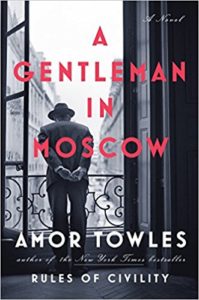Remember an Englishman in New York?
 A Gentleman in Moscow by Amor Towles, perhaps a book of manners, spans 1922 to 1954—an unruly time in Russian history. In it, Count Alexander Rostov, an aristocrat who lived it up during Czarist Russia, suffers for his privileged existence at the hands of the Bolsheviks. In 1922, he is put under house arrest at the glamorous Hotel Metropol, close to the Kremlin and convenient for Communist Party business, for the rest of his days. What ensues is the life of a sophisticate in captivity, a life lived against a wild historical backdrop. As the Count ages and transforms, the USSR develops. Towles debuted hugely with Rules of Civility, and this new book was instantly a critical success. Snotty Literati takes a look . . .
A Gentleman in Moscow by Amor Towles, perhaps a book of manners, spans 1922 to 1954—an unruly time in Russian history. In it, Count Alexander Rostov, an aristocrat who lived it up during Czarist Russia, suffers for his privileged existence at the hands of the Bolsheviks. In 1922, he is put under house arrest at the glamorous Hotel Metropol, close to the Kremlin and convenient for Communist Party business, for the rest of his days. What ensues is the life of a sophisticate in captivity, a life lived against a wild historical backdrop. As the Count ages and transforms, the USSR develops. Towles debuted hugely with Rules of Civility, and this new book was instantly a critical success. Snotty Literati takes a look . . .
Jennifer: I didn’t get to read his debut (though it’s on my TBR pile). I know you read it, and loved it. What did you think of his follow-up?
Lara: I absolutely adored The Rules of Civility. This one . . . I’m going to make a lot of friends and family very unhappy . . . not so much.
Jennifer: Uh-oh, Spaghettios. Yeah, that’s dangerous territory you’re heading into, my friend. You didn’t like it. Hmm. I did. I liked it quite a bit. But why didn’t you?
Lara: I know! And that’s correct. I didn’t love it. I loved parts of it . . . but not enough. I really think that this is the result of not reading it last year when I bought it and hearing everyone—I mean EVERYONE– rave about it being THEBESTMOSTLOVELYAMAZINGBOOKEVEREVERREALLYEVER. I went in with super high expectations and found a lot of it—gasp—boring.
Jennifer: I think I can see that, though I didn’t find it boring. It’s like a nice cup of tea, served in a pretty tea cup on a pretty saucer that matches. You know? I think I liked certain aspects of it, especially. I found the prose elegant, charming. Consider this bit:
“For pomp is a tenacious force. And a wily one too. How humbly it bows its head as the emperor is dragged down the steps and tossed in the street. But then, having quietly bided its time, while helping the newly appointed leader on with his jacket, it compliments his appearance and suggests the wearing of a metal or two. Or, having served him at a formal dinner, it wonders aloud if a taller chair might not have been more fitting for a man of such responsibilities…”
Or this gem:
“You may accuse a dog of eating without grace or of exhibiting a misplaced enthusiasm for the tossing of sticks, but you may never accuse one of giving up hope.”
I think the writing was, um, charming. I was charmed. It’s elegant.
Lara: The writing is elegant. It’s like a quiet, lazy afternoon. Which is well and good. I don’t think I expected so many people to rave about a really quiet book. With all the love, I think I expected more to have happened. It’s funny that you mention tea. I think this quote sums up our charming, dashing Count:
“For his part, the Count had opted for the life of the purposefully unrushed. Not only was he disinclined to race toward some appointed hour – disdaining even to wear a watch – he took the greatest satisfaction when assuring a friend that a worldly matter could wait in favor of a leisurely lunch or stroll along the embankment. After all, did not wine improve with age? Was it not the passage of years that gave a piece of furniture its delightful patina? When all was said and done, the endeavors that most modern men saw as urgent (such as appointments with bankers and the catching of trains), probably could have waited, while those they deemed frivolous (such as cups of tea and friendly chats) had deserved their immediate attention.”
Jennifer: Yes, that’s another elegant bit of prose. I might throw in this praise: Towles commits, so to speak, to a tone. This sophisticated, elevated, well-coiffed prose … And then, quite admirably, he maintains the tone throughout a rather big book. He is consistent in voice, language, and sound. I think the book sounded great.

Google Image
Lara: So let’s get into some details. In the beginning of the book, the Count, who has been a long-term resident of the Hotel Metropol (a real place), is sentenced for publishing a poem. His master suite is downsized to not much more than a crawl space in the hotel attic. He edits his life of possessions down to a few must-haves: books, embroidery scissors belonging to his dead sister, and his desk.
I did love that he kept his books.
He encounters a young, precocious girl named Nina, who strangely befriends him. The Count, ever-charming, entertains her questions and accepts her friendship which continues across several years. Time passes, Nina grows up, and leaves. Several years later, Nina returns to the Hotel Metropol, married and with a five- or six-year-old daughter needing the Count’s help. Her husband has been arrested and he’s off to Siberia. Nina needs to set up a new home near him, and she asks the Count to care for her child. She promises to return within two months to retrieve the young Sophia. And it’s pretty clear what’s going to happen.
Jennifer: She never comes back.
Lara: That’s right. She never comes back.
Jennifer: Which is a very subtle collection of ideas, really.
There is, primarily, the assessment made by Nina. Nina, by the time she shows up on the Metropol doorstep, is a virtual stranger again. And she’s a good Commie. Yet, despite all this, she turns to the Count for help in her biggest time of need. He is the one. He will take care of her child. This is a subtle commentary, I would say, on aristocracy, character, and communism.
To develop this further, we might consider how this quiet moment is a very non-quiet assessment of the Russian Revolution. It ultimately failed. In a quiet book (more on this quietude later), Towles quietly reveals the failures of the Soviet Union. It is a book of quiet moments that reveal the loud message of Soviet failure.
Lara: What we have is a story about an exiled Count left to raise this young girl and create a life for her within the walls of a hotel. I actually loved the parts of the book that focused on Sophia and Count Alexander. It was during the other hotel happenings that my attention waned.
Jennifer: Well, I do like that you’ve called this is a quiet book—and it is odd that such a quiet book was a big hit. This warrants development. I think that the Count’s transformation to a father-figure (if we can call it transformation) is the popular draw. That he transforms, as alluded to in the intro, might be a question. Before I pontificate, let me ask you: Does he transform? Is this about character development?
Lara: I don’t think he transforms as much as he gains an appreciation for his life and how limiting it is for his now-daughter. He doesn’t become a different person to raise her. He stays true to himself. What happens is the realization he comes to when Sophia is nearly an adult—the realization that attempting to create a meaningful life for himself while exiled within the confines of a building was his charge. Not hers.
Jennifer: Well, see, you’re saying things I like. I do think he stays true to himself, and this is an amazing aspect of the book. I think that this book reveals a kind of internal dignity that can go beyond circumstance. The Count proves to be a gentleman, no matter the circumstances.
More complexly, this novel ends up being a pretty damning critique of the USSR. When the Count is first brought into contact with the young Nina, they have the following exchange:
“The age of the nobility has given way to the age of the common man,” she said with the pride of one who has recited her times tables correctly. “It was historically inevitable.”
“Yes,” said the Count. “So I’ve been told.”
Then, we witness this Age of the Common Man. What we see is that, ironically, the thing it cannot touch is the character of a man or woman. The Count’s nobility remains intact, on the one hand. On the other, bad people—despite communist ideals and utopian ideas—are still pretty bad. Character transcends political circumstances. The Age of the Common Man failed to understand just what it meant to be a Man. (Or a Woman.)
So he transforms his circumstances, while remaining a gentleman.
Lara: That’s fair. Listen, I am the biggest fan of talkie books and talkie movies. I don’t need pages packed full of action and intrigue, but I needed a little more to happen than what did.
I do have to say that there’s a major plot twist—that we won’t spill—that I thought was brilliant and even gasp-worthy.
This twist, and these nice exchanges between the Count and Anna, Sophia, and Anna (the love interest we haven’t even talked about), were just that: nice.
Jennifer: Yes. Lots of nice.
Lara: And, while I don’t want to cop out on my feeling about it, I do think books can work for us or not work for us at certain times in our lives. For some reason, this one didn’t resonate with me as much as I hoped it would. I may have to revisit it at another time.
Jennifer: I was sorta into the whole Russian thing. I enjoyed it, but—readers—we’re slightly divided, and our discussion begs an important question: For what purpose do you read a book?
If you’re into the twist and turn of a sentence for its own sake (and that’s enough to satiate you), try this book. If you’re wanting a bit of head-turning plot splendor, move on. I truly see your point, Lara. I do. I just liked that sedate cup of Earl Grey.
Lara: Hey. I can do cups of tea books. I am a huge Kent Haruf fan.
So, Snotties? Chime in! What did you think? Let us know and join us next month when we chat up National Book Award Finalist. I Am Not Your Typical Mexican Daughter by Erika L. Sanchez.
_______________________________________________________________________
Can’t get enough of Snotty Literati? Follow us on Facebook!
Want to read more from Jennifer? Check her out at www.jenniferspiegel.com
Want to see what Lara is up to? Go to www.onelitchick.com

For 315 pages (so far) I have been wondering what I am missing about this book – am I unsophisticated and I just don’t get it? Or is this a case of me picking up a book too late – and the book just can’t possibly measure up – read: Gone Girl and The Girl on the Train? Anyway, still more pages to read. Just glad I am not the only one not getting what all the hype has been about…!